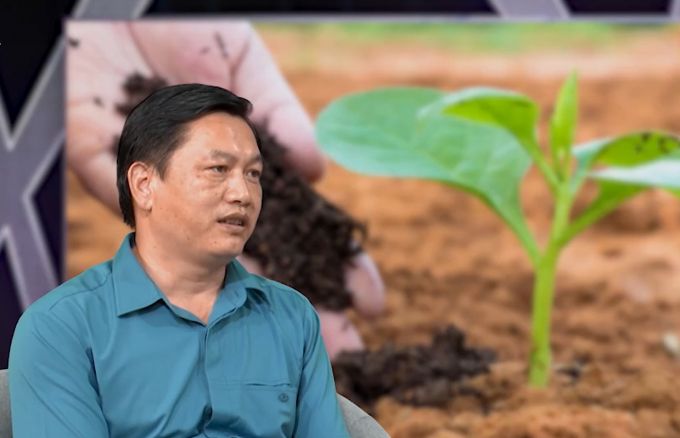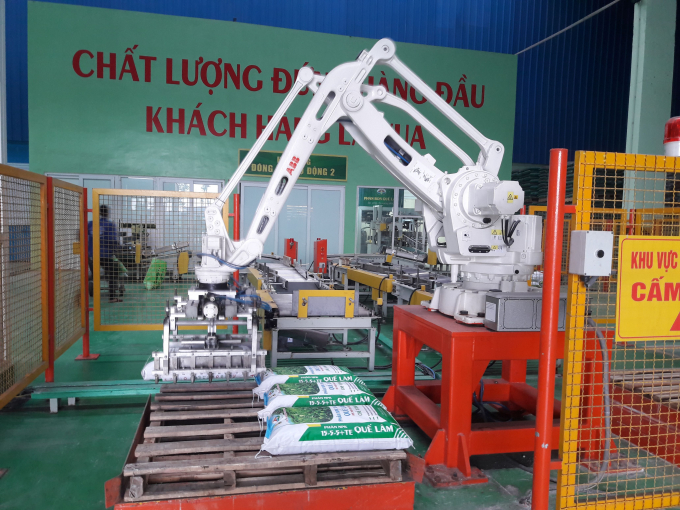June 1, 2025 | 19:48 GMT +7
June 1, 2025 | 19:48 GMT +7
Hotline: 0913.378.918
June 1, 2025 | 19:48 GMT +7
Hotline: 0913.378.918
Mr. Khac Ngoc Ba, Deputy General Director of Que Lam Group, said that the company has been a pioneer in organic and microbial fertilizer manufacture for over two decades and is actively supporting organic agriculture production.
Mr. Ba underlined that in order to maintain a sustainable farm and a healthy ecosystem, input material is critical. If agricultural inputs are clean, either the agricultural products or the environment will be clean as well.

Mr. Khac Ngoc Ba, Deputy General Director of Que Lam Group. Photo: Nguyen Huan.
If we want to have safe agricultural goods, we must include organic and microbiological production technologies into farming from the start. Standardization begins at the input level can benefit both producers and consumers by ensuring the safety of agricultural goods and a healthy ecological environment.
He added that the development of organic fertilizer in particular, and organic agricultural production in general, is smooth from the center to the local levels, owing to a fully developed legal framework, standard, and protocol. This is an ideal atmosphere for organic agricultural enterprises to grow and prosper.
Additionally, our country's rate of adoption of organic and microbial fertilizers is still low, providing a greater chance to diversify cultivation by introducing the new type of fertilizer into agriculture.
With microbial organic fertilizers accounting for around 3% of all fertilizers used today, according to Mr. Khac Ngoc Ba, the market for organic fertilizer manufacturing remains very vast for all firms.
However, for organic agriculture to really succeed, it is required to invest heavily in organic fertilizer products made in an industrial and modern method, in addition to the traditional method.
As a consequence, Que Lam Group invested in modern manufacturing lines and technologies between 2018 and 2020 in order to manufacture tons of industrial organic fertilizers. This is a significant step toward the agricultural use of microbial organic fertilizers.
However, Mr. Khac Ngoc Ba said that in order for organic fertilizer production to grow swiftly and sustainably, the communication stage is critical for changing farmers' understanding and practices around fertilizer use.
Because the Que Lam Group's 20-year history of manufacturing microbial organic fertilizers demonstrates that Vietnam's technology and raw ingredients are now easily accessible, if not redundant.

Que Lam Group's automatic organic fertilizer production line. Photo: Nguyen Huan.
That is tens of millions of tons of peat, garbage, and by-products from agriculture, animal husbandry, and aquaculture that, if not collected, pose a significant danger of inflicting environmental damage.
That is also why Que Lam Group invests substantially in technology that converts wastes and by-products into raw materials for the manufacture of microbial organic fertilizers.
"Over the years, we have shown that when we begin growing crops using microbial organic fertilizers and biological products, yields are consistent, quality is high, and pests and illnesses are significantly reduced," Mr. Khac Ngoc Ba noted.
As he noted, bringing fresh materials from waste and by-products of cultivation, husbandry, and aquaculture that have not been treated with microbiological technology or composted without ensuring fertilizer application to plants results in an immediate benefit but leaves behind numerous epidemic consequences. As a result, it is essential to treat using technology prior to cultivating.
Que Lam Group has also been transferring technology to all gardeners and farmers in recent years, with preparations for converting agricultural waste and by-products into safe organic fertilizers.
The Group wants to continue guiding local governments in better coordinating their efforts to increase and promote the use of microorganic fertilizers in agricultural practices by around 3-5 percent.
The growing cost of inorganic fertilizers, which has reached an all-time high in relation to the cost of agricultural goods, has created a slew of issues for farmers and companies. Mr. Khac Ngoc Ba advised firms involved in organic fertilizers and microorganisms to engage with and help farmers toward increased use of efficient and inexpensive organic fertilizers, both to alleviate pressure on inorganic fertilizers and to benefit domestic agriculture in the long term.
Translated by Linh Linh

(VAN) Seafood by-products are opening a new path, combining green growth and technological innovation to enhance the industry's value.

(VAN) Mr. Nguyen Thanh Cong, Vice Chairman of the Son La Provincial People's Committee, reflects on Son La’s journey from barren hills to fruitful orchards after a decade of hard work.

(VAN) FAO’s Director-General addresses the 5th Baghdad International Water Conference.
/2025/05/26/1716-4-nongnghiep-191706.jpg)
(VAN) Chain linkages, technological innovation, and raw material zoning are three strategic pillars for the coconut industry to strongly develop and elevate its position on the global agricultural map.
![Advanced mariculture – an inevitable trend: [4] Accompanied by scientists](https://t.ex-cdn.com/nongnghiepmoitruong.vn/608w/files/sohk/2025/05/13/1941-pgsts-vo-van-nha-140958_717.jpg)
(VAN) According to Assoc. Prof. Dr. Vo Van Nha, Director of the RIA III, the development of advanced offshore mariculture is no longer an option but an essential path for Vietnam’s fisheries sector.

(VAN) Vietnam is intensifying the development of mollusk farming areas that meet international standards, aiming for sustainable growth and enhancing its export position in the global seafood market.
![Advanced mariculture – an inevitable trend: [3] Policy-driven momentum](https://t.ex-cdn.com/nongnghiepmoitruong.vn/608w/files/doanhtq/2025/05/21/0104-0616-0348-nuoi-bien-170339_789.jpg)
(VAN) To ensure the success of offshore mariculture that uses advanced technologies, it is essential to establish supportive policies that inspire both individuals and enterprises to invest with confidence.